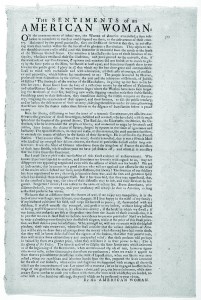 The Sentiments of an American Woman. Courtesy of the Library of Congress, Rare Book and Special Collections Division.
The Sentiments of an American Woman. Courtesy of the Library of Congress, Rare Book and Special Collections Division.
The role of women in America in the seventeenth and eighteenth centuries was not confined simply to matters within their households, as some have popularly believed. Historian Laurel Thatcher Ulrich has come up with the term “deputy husbands” to describe women’s potential role in the colonial household. In some cases, women “shouldered male duties,” Ulrich writes. “These might be of the most menial sort—but they could also expand to include some responsibility for the external affairs of the family.”1
A wife could act as a surrogate for her husband, even in legal matters, in times of necessity.2 The necessity might arise because of a husband’s absence—if, for example, his occupation required him to spend a great deal of time away from home. Some men were frequently away at sea, as noted by Crèvecoeur in Letters from An American Farmer: “As the sea excursions are often very long, their [fishermen's] wives in their absences are necessarily obliged to transact business, to settle accounts, and in short to rule and provide for their families.”3
A wife might also be thrust into the role of deputy husband when her husband was away at war. A 1780 broadside written by “An American Woman” addresses this topic, averring that women are up to the task: “On the commencement of actual war, the Women of America manifested a firm resolution to contribute as much as could depend on them, to the deliverance of their country. Animated by the purest patriotism . . . they aspire to render themselves more really useful; and this sentiment is universal from the north to the south of the Thirteen United States.”4
Sometimes it wasn’t the husband’s occupation but rather an illness or disability that led a wife to step forward and engage in business. An example is found in the proceedings of the Salem Quarterly Court of June 1672. When Philip Cromwell, “having taken a cold in his head, his hearing was then very bad,” he expressed trust in his wife to undertake his affairs. According to the other parties in a trade, Cromwell claimed: “Whatsoever his wife doth ingage, he would make it good.”5 Mrs. Cromwell remains somewhat anonymous, as her first name is never given—which was generally true in such cases. As Ulrich notes, “As deputy husbands, a few women . . . might emerge from anonymity; most did not.”6
Perhaps Ulrich’s most salient point is that the “role of deputy husband reinforced a certain elasticity in premodern notions of gender. No mystique of feminine behavior prevented a woman from driving a hard bargain or chasing a pig from the field.”7 Notions of clearly defined gender roles were sometimes overridden by a need for wives to perform activities traditionally attributed to their husbands for the good of the family.
Notes
1 Laurel Thatcher Ulrich, Good Wives: Image and Reality in the Lives of Women in Northern New England, 1650-1750 (New York: Knopf Doubleday, 2010), p. 9.
2 Ibid.
3 J. Hector St. John de Crèvecoeur, Letters from an American Farmer (1782; reprint, Carlisle, Mass.: Applewood Books, 2007), p. 205.
4 Also depicted in online exhibit, “A Woman’s Work is Never Done,” at the American Antiquarian Society, americanantiquarian.org/Exhibitions/Womanswork/waryears.htm.
5 Records and Files of the Quarterly Courts of Essex County, Massachusetts, Vol. 5, (Salem, Mass.: Essex Institute, 1916), p. 57.
6 Ulrich, Good Wives, p. 36.
7 Ulrich, Good Wives, p. 50.
Share this:
About Zachary Garceau
Zachary J. Garceau is a former researcher at the New England Historic Genealogical Society. He joined the research staff after receiving a Master's degree in Historical Studies with a concentration in Public History from the University of Maryland-Baltimore County and a B.A. in history from the University of Rhode Island. He was a member of the Research Services team from 2014 to 2018, and now works as a technical writer. Zachary also works as a freelance writer, specializing in Rhode Island history, sports history, and French Canadian genealogy.View all posts by Zachary Garceau →